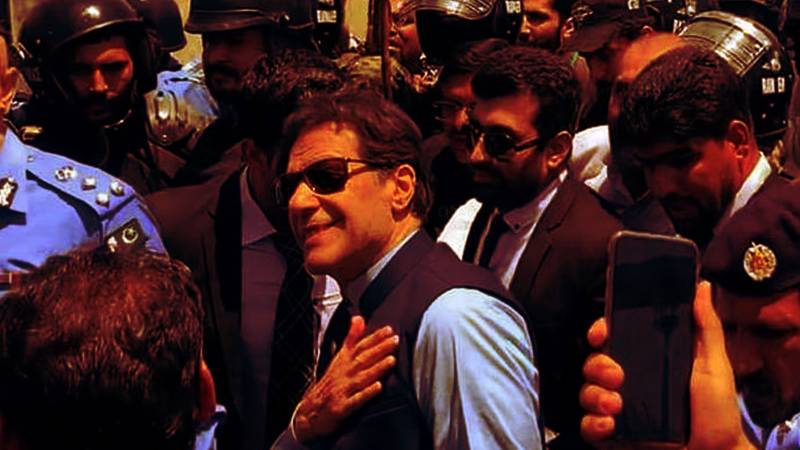
In a significant development ahead of the Pakistan Tehreek-e-Insaf (PTI) party’s planned protest on November 24, the Islamabad High Court (IHC) granted bail to PTI founder Imran Khan in the new Toshakhana case.
Justice Miangul Hassan Aurangzeb of the IHC approved Imran Khan’s bail against two surety bonds of Rs1 million each. These bonds must be submitted by separate guarantors. As a result of this ruling, Imran Khan is no longer wanted in any cases within Islamabad’s jurisdiction.
The court, however, ordered the former Prime Minister to appear before the trial court. It warned that if he fails to cooperate with the trial court, his bail could be cancelled.
Imran Khan and his wife, Bushra Bibi, were arrested on July 13 in connection with this case. Their arrest came shortly after they were acquitted by an Islamabad district and sessions court in the “Iddat case” (also known as the un-Islamic nikah case). Bushra Bibi was released from jail last month after spending about nine months behind bars in the Toshakhana 2.0 case.
The Toshakhana case, initially handled by the National Accountability Bureau (NAB) court, was later transferred to the Federal Investigation Agency (FIA) following a Supreme Court ruling that restored amendments to anti-corruption laws.
During the hearing, the FIA prosecutor expressed concerns over media reports that had prematurely suggested that bail would be granted. Justice Aurangzeb told the prosecutor to disregard media speculation, emphasizing that the court's decisions would not be influenced by outside narratives. The judge also questioned certain claims made in the media, particularly regarding the valuation of a jewelry set, and asked how its worth had been determined.
Imran Khan’s lawyer, Barrister Salman Safdar, responded by saying that it was the prosecution's responsibility to clarify the matter in court. He also pointed out discrepancies in the receipts related to the case, explaining that the receipts were issued in Bushra Bibi’s name, not Imran Khan’s. The defense also argued that the case was based on testimonies from key witnesses, including Sohaib Abbasi, who had been pardoned and made an approver in the case. Barrister Safdar explained that while Abbasi had alleged threats from Imran Khan, he denied having any direct interaction with either Imran or Bushra Bibi.
The court further questioned if customs officers involved in the jewelry’s valuation had reported any intimidation, to which the defense replied that no such claims had been made by these officers.
The FIA prosecutor argued that a jewelry set was not deposited in the Toshakhana and that its undervaluation caused financial loss to the state. Justice Aurangzeb, however, questioned how Imran Khan had benefited from the undervaluation, noting that the prosecutor had assumed that Imran Khan benefited from his wife’s gains. Justice Aurangzeb dismissed this assumption, saying, “My wife’s things are not mine. I don’t know what year we are living in.”
Barrister Safdar defended his client, saying that all gifts were acquired according to the Toshakhana policy of 2018, with valuations done as per the law. He added that payments had been made according to the policy, and no wrongdoing was involved. Justice Aurangzeb pointed out that the previous government had withheld Toshakhana details despite requests from the court.
The prosecution also raised concerns about Imran Khan’s conduct during the trial, accusing him of delaying tactics. The FIA presented evidence showing that Abbasi had apologized for undervaluing the jewelry set, and this apology was accepted by the NAB chairman. However, the defense criticized the FIA for hastily filing its challan (formal charge) and claimed that key aspects of the investigation had been overlooked.
The court noted that the Toshakhana case had experienced significant delays, with over three years passing before it was officially registered.
Following the court’s decision, PTI spokesperson Sheikh Waqas Akram welcomed the ruling, saying that Imran Khan would soon be free in other "fabricated cases" as well. He accused the government of trying to create conflict between PTI and state institutions and claimed that the ruling party was using all its tactics to disrupt the planned November 24 protest.
In contrast, the ruling Pakistan Muslim League-Nawaz (PML-N) reacted by calling Imran Khan the "laadla" (blue-eyed), implying favoritism towards him.

